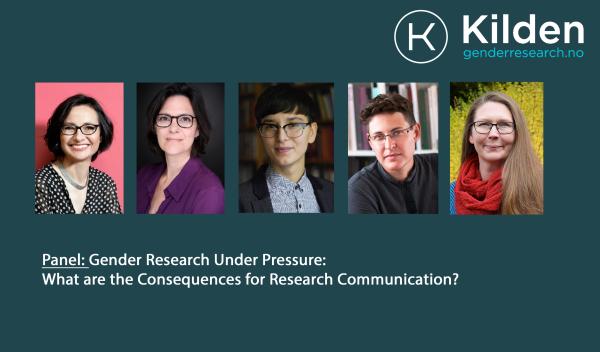Gender Research Under Pressure: Consequences for Research Communication?

Open forum at the 10th European Feminist Research Conference, Göttingen, Germany
Time: Friday 14 September, 3 PM
Place: Room ZHG 007, Georg-August-University Göttingen, Central Auditorium Building.
Over the last few years, the intervention of governments and political bodies in research institutions in Europe has increased. This has put basic academic values, such as researchers' autonomy, under pressure. These interventions, in combination with anti-feminism, have had significant costs for gender studies. For example, in countries such as Poland and Hungary, scholars experience that governments are closing research institutions, and even prohibiting researchers from conducting their job. In other countries, such as in Sweden, the media has demonstrated a disturbing interest in contesting the relevance and legitimacy of gender studies.
When the confidence in gender research is decreasing among policy makers, governmental bodies and among people in general, how can we, as responsible for disseminating gender research to the public, work to change this alarming trend and, at the same time, maintain our role as critical and independent journalists or scholars?
What kind of challenges are gender scholars and communicators confronted with and how do we meet them? In a media landscape adjusted to fast pace and shallow presentations, how do we ensure the public’s access to reliable research and critical analysis?
Kilden genderresearch.no invites scholars from five European countries to share their experiences in promoting gender research and gender equality in the public sphere and in the media, and to discuss strategies and solutions for the time ahead.
Panel:
Agnieszka Graff is a Polish feminist scholar, activist and media commentator. As co-organizer and speaker of Congress of Polish Women, she writes for major journals and newspapers, including the liberal daily Gazeta Wyborcza. She teaches US culture, literature and film, African American studies and gender studies at the University of Warsaw, and is currently co-editing an upcoming issue of the journal Signs on gender and the global right.
Kajsa Widegren is research coordinator at the Swedish Secretariat for Gender Research. She holds a Phd in Gender Studies, and has done research and teaching on feminist cultural studies at the University of Gothenburg.
Marianna Szczygielska is a postdoctoral fellow at the Max Planck Institute for the History of Science, Dept. III Artefacts, Knowledge and Action. She received her PhD in Comparative Gender Studies at the Central European University in Budapest, Hungary. Her research focuses on environmental humanities, posthumanism, animal studies, queer theory, critical race studies, philosophy of science, and feminist STS.
Elisa A.G. Arfini is Co-Investigator of the H2020 Marie Sklodowska-Curie ITN project ‘‘GRACE - Gender and Cultures of Equality’’ for Orlando association in Bologna and has been the International Relations Officer at the Italian Women's Library since 2013. They are currently Research Fellow at the University of Milan and Adjunct Professor in Gender Studies at the University of Bologna.
Paula-Irene Villa is Professor of Sociology, LMU München. She is the chair of ForGenderCare, a German research network on gender and care. Her latest article is "German Angst? Anti-Genderismus" in Anti Gender Campaigns in Europe. Mobilizing against Equality (eds: Paternotte, David / Kuhar, Roman).
Moderator: Mari Lilleslåtten, Research journalist, Kilden genderresearch.no
Welcome!
Find the event in the conference programme.